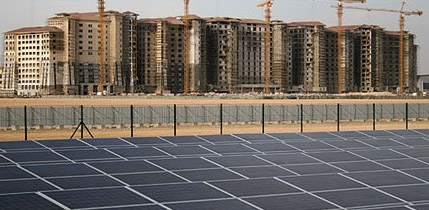Masdar announced the development of a 15-megawatt solar power project in Nouakchott, the capital city Mauritania. The plant will deliver 10 per cent of electricity capacity in Mauritania. The project is the first utility-scale solar power installation in the country.
“Mauritania has some of the highest levels of solar radiation in the world, making it an ideal place for solar power installations,” said Mauritania’s Minister of Petroleum, Energy and Mines Taleb Ould Abdivall. “Masdar has gained tremendous experience in the renewable energy sector through its projects worldwide and we look forward to future opportunities for cooperation,” Abdivall added.
Mauritania has an installed grid capacity of just 144 megawatts, supplied mostly by diesel generators, but the country has significant untapped renewable energy potential in the form of both solar and wind. In fact, the country’s wind energy potential is almost four times its annual energy demand.
The 15-MW solar photovoltaic project will provide for the annual demand growth in the country, estimated to be at a rate of 12 per cent in 2012. It will also supply much-needed power to Mauritania, which currently faces severe energy shortages. The country has a low electrification rate of 60 per cent.
The Masdar solar power project is being built next to the university in Nouakchott, currently under construction, and will serve as a learning laboratory for solar energy development in the Islamic Republic of Mauritania.
“This project also proves that energy access and commercially viable renewable energy can go hand-in-hand,” said Dr Sultan Ahmad Al Jaber, chief executive officer of Masdar. “Partnerships are at the core of Masdar’s business strategy and projects like this one underscore the critical role collaboration plays in renewable energy development.
“With the demand for energy rapidly increasing — especially in the developing world — tapping into renewable energy is critical,” added Dr Al Jaber. “The integration of wind, solar and hydro power helps to reduce the strain on our natural resources and serves as a bridge to energy security and economic development opportunities. Investing in renewable energy preserves natural resources, contributes to energy security and water security, and fosters sustainable development.”
Gulf News
25 October
























































